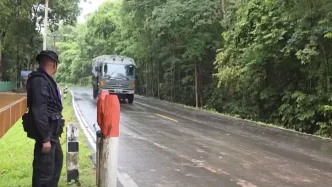In a sharp escalation of cross-border tensions, Cambodian Prime Minister Hun Manet has announced the permanent closure of key border checkpoints in response to what he describes as unilateral actions by Thailand’s military. The decision, made public on June 22, 2025, affects the Choub Korki checkpoint in Banteay Ampil district and the Choam checkpoint in Anlong Veng, both located in Cambodia’s Oddar Meanchey province. This move comes after Thailand’s Military Region 2 closed the Chong Sai Taku-Choub Korki checkpoint earlier this month, disrupting trade, travel, and family connections along the shared frontier.
Background of the Border Dispute
The current standoff traces back to June 7, 2025, when Thai military authorities began imposing restrictions and closures at multiple border points without prior consultation with Cambodian officials. According to Cambodian authorities, these actions have caused significant hardship for communities on both sides who rely on cross-border movement for their livelihoods. The closures have halted the flow of goods, separated families, and strained local economies, particularly in rural border areas where trade is a lifeline.
In his address on June 22, Prime Minister Hun Manet expressed frustration over the lack of coordination between Thailand’s political leadership and its military. “I am not sure if this is tactics or strategy of working relationship between Thai government and Thai army, because it seems there is a lack of consensus and clarity on their real objective regarding border closures” he stated. His remarks highlight a perceived disconnect within Thai decision-making circles, which he suggested may be contributing to the ongoing confusion.
Cambodia’s Firm Stance
Manet was unequivocal in his criticism of Thailand’s approach, accusing the Thai military of disregarding the impact of their actions on ordinary citizens. “Since 7 June 2025, the Thai army has unilaterally implemented closures of border checkpoints between Cambodia and Thailand without much consideration of its negative effects on people of both countries” he said. He emphasized that Cambodia had no intention of creating difficulties for border communities but warned that his government would not hesitate to respond if the Thai military continued to exert pressure through such measures. “If Thai army continue to use this method to put pressure on Cambodia, Cambodia can answer accordingly at anytime” he added.
The Cambodian leader also dismissed the need for bilateral negotiations to resolve the issue, arguing that Thailand’s unilateral closures could be reversed just as easily. He proposed a straightforward solution: if Thailand reopens its side of the checkpoints, Cambodia would follow suit within five hours. “Such a simple solution can be done easily and quickly without the need to have any bilateral negotiation” Manet affirmed, placing the onus on Thai authorities to take the first step toward de-escalation.
Broader Implications for Bilateral Relations
The border closures represent more than a logistical challenge; they underscore deeper tensions between Cambodia and Thailand, two neighbors with a history of territorial disputes and political friction. The shared border, stretching over 800 kilometers, has long been a flashpoint, with past conflicts over areas like the Preah Vihear temple complex fueling mistrust. While the current dispute centers on checkpoint operations, it reflects broader questions about military autonomy, regional cooperation, and the balance of power in mainland Southeast Asia.
Analysts suggest that the closures could have ripple effects beyond the immediate border region. Cross-border trade, valued at millions of dollars annually, is a critical component of both nations’ economies, particularly for Cambodia, which exports agricultural products and imports fuel and consumer goods from Thailand. The Cambodian government’s decision to suspend all fuel and gas imports from Thailand, effective June 23, 2025, adds another layer of economic strain to the dispute. Though exact figures are unavailable at this time, the cost of rerouting imports or sourcing alternatives could drive up prices for Cambodian consumers, particularly in border provinces.
Impact on Border Communities
For the people living along the Cambodia-Thailand border, the closures are more than a political spat—they are a direct threat to their way of life. In Oddar Meanchey province, where the Choam and Choub Korki checkpoints are located, many families depend on daily crossings for work, trade, and social ties. Small-scale traders, who shuttle goods like rice, vegetables, and handicrafts across the border, have been hit hardest by the restrictions. “We can’t sell our produce, and we can’t buy what we need from the other side” said a local vendor in Anlong Veng, speaking to regional media on condition of anonymity. “This is our life, and now it’s stopped.”
The closures have also disrupted family connections, with many unable to visit relatives on the opposite side of the border. In a region where historical conflicts have already left deep scars, such separations carry emotional as well as practical weight. Cambodian officials have repeatedly highlighted these human costs in their statements, framing the Thai military’s actions as callous and disproportionate.
Thailand’s Perspective and Internal Dynamics
While Thai authorities have yet to issue an official response to Cambodia’s latest moves, the closures on their side appear to be driven by security concerns or internal military priorities. Some regional observers speculate that the Thai army’s actions may be linked to efforts to curb smuggling or unauthorized crossings, though no public evidence has confirmed this motive. Others point to domestic political pressures within Thailand, where the military often operates with significant autonomy from civilian leadership, as a potential factor behind the lack of coordination Manet referenced.
The apparent disconnect between Thailand’s government and its military raises questions about the country’s broader foreign policy approach. If, as Manet suggested, there is no clear consensus within Thai leadership on how to handle border issues, it could complicate efforts to resolve the current standoff. For now, the absence of dialogue between the two sides risks prolonging the closures and deepening mutual resentment.
Regional and International Reactions
The border dispute has drawn limited attention from regional bodies like the Association of Southeast Asian Nations (ASEAN), which typically encourages dialogue over confrontation in such matters. However, with both Cambodia and Thailand holding firm to their positions, there is little indication of immediate mediation. Neighboring countries, including Laos and Vietnam, have so far refrained from commenting publicly, though they are likely monitoring the situation given their own economic ties to the region.
Internationally, the closures are unlikely to prompt significant intervention unless they escalate into broader conflict or cause a humanitarian crisis. For now, the focus remains on the two governments and their willingness—or lack thereof—to compromise. The Cambodian defense ministry’s recent statement that the country has no intention of military aggression, including a pointed remark about lacking jets capable of reaching Bangkok, appears aimed at reassuring observers that the dispute will remain diplomatic rather than militarized.
Looking Ahead: A Path to Resolution?
As the border checkpoints remain shuttered, the immediate future looks uncertain for Cambodia-Thailand relations. Prime Minister Hun Manet’s insistence on a unilateral Thai reopening as a prerequisite for Cambodian reciprocity sets a high bar for de-escalation. If Thailand’s military or political leadership refuses to budge, the closures could become a protracted issue, further straining ties between the two nations.
For border communities, the stakes are even higher. Each day of restricted movement deepens their economic and social struggles, with no clear timeline for relief. While both governments trade barbs over responsibility, it is the ordinary citizens—traders, workers, and families—who bear the brunt of this standoff. Whether a resolution emerges in the coming days or weeks may depend less on diplomatic rhetoric and more on a shared recognition of the human cost at the heart of this dispute.
















